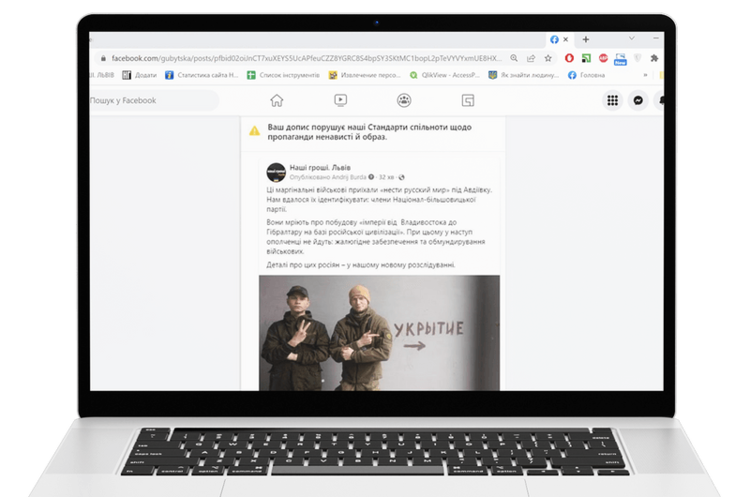Facebook restricts pages of Ukrainian media due to content about war – research
The network defines publications describing the russian military as “hate speech”

What happened? Facebook imposes restrictions on the pages of Ukrainian media – some of them were in the restriction zone and did not suspect that they got there due to the lack of transparent communication of social network support.
Source. The research by the Media Development Foundation.
Details. There are two main assumptions about the change in Facebook's perception of Ukrainian local media pages: copyright infringement or, most likely, war-related content that is identified as “problematic” or “sensitive”.
Pages of publications are often blocked by Facebook algorithms after posts describing the russian military in words that the network defines as “hate speech” or “unacceptable content”. There are lots of such examples. Much larger pages of national editions face such problems as well.
Mind has also faced this problem. Facebook has limited audience coverage for posts that “incite hatred”. For example, the posts with quotes by Ukrainian heroes on the necessity of destroying russian soldiers, are considered to be such.
It is noted that there is a separate problem of advertising offices for the media from eastern Ukraine: publications that now remain almost the only gathering point for communities scattered around the country and the world (Severodonetsk community, for instance) are forced to look for ways to circumvent international sanctions. They are recognised as temporarily occupied, and, consequently, Meta cannot have any commercial activity with them.
Editorial pages from Luhansk and Donetsk oblasts are restricted from advertising on the platform. International sanctions, which are also imposed on the temporarily occupied territories, are the reason for this. From interviews with representatives of such newsrooms, it is clear that advertising accounts linked to profiles that were registered in cities and villages from these two oblasts are blocked.
Accordingly, in order to use the opportunities of paid content promotion, editorial offices need to attract external specialists with advertising profiles registered outside Donetsk and Luhansk oblasts. It turns out that the newsrooms, whose audience needs verified information the most, face double restrictions from the platform.
If you have read this article to the end, we hope that means it was useful for you.
We work to ensure that our journalistic and analytical work is of high quality, and we strive to perform it as competently as possible. This also requires financial independence. Support us for only UAH 196 per month.
Become a Mind subscriber for just USD 5 per month and support the development of independent business journalism!
You can unsubscribe at any time in your LIQPAY account or by sending us an email: [email protected]



